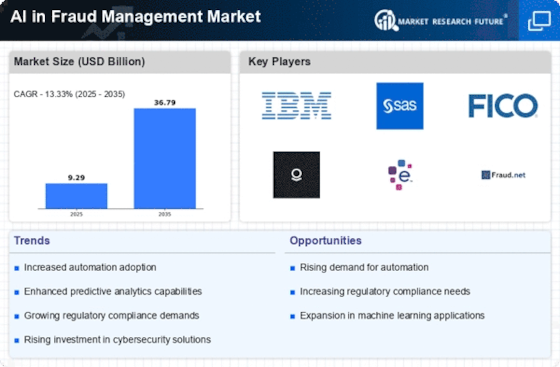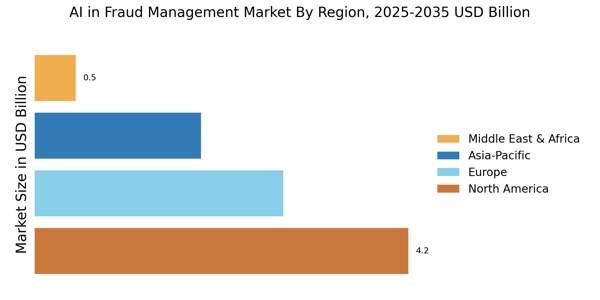Growing Regulatory Pressures
The AI in Fraud Management Market is influenced by the increasing regulatory pressures on organizations to comply with anti-fraud measures. Governments and regulatory bodies are implementing stricter guidelines to combat financial crimes, which necessitates the adoption of advanced AI solutions. Companies are now required to demonstrate their commitment to fraud prevention through effective monitoring and reporting mechanisms. This trend is likely to drive the demand for AI technologies that can automate compliance processes and ensure adherence to regulations. As organizations strive to meet these requirements, the integration of AI in fraud management becomes a strategic imperative.
Rising Cybersecurity Threats
The AI in Fraud Management Market is experiencing a surge in demand due to the increasing frequency and sophistication of cyber threats. Organizations are compelled to adopt advanced AI solutions to detect and mitigate fraudulent activities effectively. According to recent data, cybercrime is projected to cost businesses over 10 trillion dollars annually by 2025, highlighting the urgent need for robust fraud management systems. AI technologies, such as machine learning and predictive analytics, enable organizations to identify patterns and anomalies in real-time, thereby enhancing their ability to combat fraud. This trend indicates a growing recognition of the necessity for AI-driven solutions in safeguarding financial transactions and sensitive data.
Shift Towards Digital Transactions
The AI in Fraud Management Market is witnessing a transformation driven by the shift towards digital transactions. As more consumers and businesses engage in online financial activities, the potential for fraud increases. AI technologies are essential in this landscape, providing tools to analyze transaction data and identify fraudulent behavior. The rise of e-commerce and digital banking has led to a significant increase in transaction volumes, with estimates suggesting that digital payment transactions will exceed 1 trillion by 2025. This shift necessitates the implementation of AI-driven fraud management solutions to protect both consumers and businesses from financial losses.
Enhanced Data Analytics Capabilities
The AI in Fraud Management Market benefits significantly from advancements in data analytics. Organizations are increasingly leveraging AI technologies to analyze vast amounts of data, which allows for more accurate fraud detection and prevention. The ability to process and analyze data in real-time enhances decision-making processes, enabling businesses to respond swiftly to potential threats. As per industry reports, the market for AI-driven data analytics is expected to reach 200 billion dollars by 2026, underscoring the importance of integrating AI into fraud management strategies. This capability not only improves operational efficiency but also fosters a proactive approach to fraud prevention.
Increased Investment in AI Technologies
The AI in Fraud Management Market is experiencing a notable increase in investment as organizations recognize the value of AI technologies in combating fraud. Companies are allocating substantial resources to develop and implement AI-driven solutions that enhance their fraud detection capabilities. Recent statistics indicate that investment in AI for fraud management is expected to grow by over 30% annually, reflecting the urgency to adopt innovative technologies. This influx of capital is likely to accelerate the development of sophisticated AI tools that can adapt to evolving fraud tactics, thereby strengthening the overall security posture of organizations.

















